For some situation, we need to implement a FIFO execution model using multiple threads, like the following watchdog scenario.
A postman delivers books to the door from time to time. A puppy (watchdog) is at home, and he will gladly grab all the books that delivered at the door and run away into the back yard to do some work with the books, in a sequential order as the books are arrived. While the puppy is working on the books at the back yard, the postman may or may not deliver some more books. After the puppy work is done in the yard, the puppy will run back to the front door to see if the postman has already delivered some more books or not. If not, the puppy will just wait at the front door for the postman, else the puppy will grab all the books available at the door and repeat.
So as easily as you can figure out, the postman is the producer thread, the puppy is the consumer thread. There can be multiple postmen (multiple producer threads) to deliver the books at the door, however there will be only one puppy (consumer thread) because we want to make sure that an item (a book) can only be worked on after a previous item has been finished worked on.
This MSDN article has provided a great way to do this: http://msdn.microsoft.com/en-us/magazine/dd419664.aspx. The article provides two models: first with a dedicated thread, which will block if no work items are available; the second model is my favorite, it utilizes the thread pool, and it will not block if there is no work items are available (after all, what's the point of blocking if there is no work?), and therefore save us a thread.
Here is the code for the second model.

 Code
Code
 using System;
using System;
 using System.Collections.Generic;
using System.Collections.Generic;
 using System.Threading;
using System.Threading;

 namespace TestWatchDog
namespace TestWatchDog


 {
{
 internal class WorkItem
internal class WorkItem


 {
{
 public WaitCallback Callback;
public WaitCallback Callback;
 public object State;
public object State;
 public ExecutionContext Context;
public ExecutionContext Context;

 private static ContextCallback _contextCallback = s =>
private static ContextCallback _contextCallback = s =>


 {
{
 var item = (WorkItem)s;
var item = (WorkItem)s;
 item.Callback(item.State);
item.Callback(item.State);
 };
};

 public void Execute()
public void Execute()


 {
{
 if (Context != null)
if (Context != null)
 ExecutionContext.Run(Context, _contextCallback, this);
ExecutionContext.Run(Context, _contextCallback, this);
 else Callback(State);
else Callback(State);
 }
}
 }
}

 class FifoExecution
class FifoExecution


 {
{
 private Queue<WorkItem> _workItems = new Queue<WorkItem>();
private Queue<WorkItem> _workItems = new Queue<WorkItem>();
 private bool _delegateQueuedOrRunning = false;
private bool _delegateQueuedOrRunning = false;

 public void QueueUserWorkItem(WaitCallback callback, object state)
public void QueueUserWorkItem(WaitCallback callback, object state)


 {
{
 var item = new WorkItem
var item = new WorkItem


 {
{
 Callback = callback,
Callback = callback,
 State = state,
State = state,
 Context = ExecutionContext.Capture()
Context = ExecutionContext.Capture()
 };
};
 lock (_workItems)
lock (_workItems)


 {
{
 _workItems.Enqueue(item);
_workItems.Enqueue(item);
 if (!_delegateQueuedOrRunning)
if (!_delegateQueuedOrRunning)


 {
{
 _delegateQueuedOrRunning = true;
_delegateQueuedOrRunning = true;
 ThreadPool.UnsafeQueueUserWorkItem(ProcessQueuedItems, null);
ThreadPool.UnsafeQueueUserWorkItem(ProcessQueuedItems, null);
 }
}
 }
}
 }
}



 using while loop#region using while loop
using while loop#region using while loop
 private void ProcessQueuedItems(object ignored)
private void ProcessQueuedItems(object ignored)


 {
{
 while (true)
while (true)


 {
{
 WorkItem item;
WorkItem item;
 lock (_workItems)
lock (_workItems)


 {
{
 if (_workItems.Count == 0)
if (_workItems.Count == 0)


 {
{
 _delegateQueuedOrRunning = false;
_delegateQueuedOrRunning = false;
 Console.WriteLine("finished looping");
Console.WriteLine("finished looping");
 break;
break;
 }
}
 item = _workItems.Dequeue();
item = _workItems.Dequeue();
 }
}

 try
try  { item.Execute(); }
{ item.Execute(); }
 catch
catch


 {
{
 ThreadPool.UnsafeQueueUserWorkItem(ProcessQueuedItems, null);
ThreadPool.UnsafeQueueUserWorkItem(ProcessQueuedItems, null);
 throw;
throw;
 }
}
 }
}
 }
}
 #endregion
#endregion


 recursive#region recursive
recursive#region recursive
 //private void ProcessQueuedItems(object ignored)
//private void ProcessQueuedItems(object ignored)
 //{
//{
 // WorkItem item;
// WorkItem item;
 // lock (_workItems)
// lock (_workItems)
 // {
// {
 // if (_workItems.Count == 0)
// if (_workItems.Count == 0)
 // {
// {
 // _delegateQueuedOrRunning = false;
// _delegateQueuedOrRunning = false;
 // return;
// return;
 // }
// }
 // item = _workItems.Dequeue();
// item = _workItems.Dequeue();
 // }
// }
 // try { item.Execute(); }
// try { item.Execute(); }
 // finally
// finally
 // {
// {
 // ThreadPool.UnsafeQueueUserWorkItem(ProcessQueuedItems,
// ThreadPool.UnsafeQueueUserWorkItem(ProcessQueuedItems,
 // null);
// null);
 // }
// }
 //}
//}
 #endregion
#endregion
 }
}

 class TestWatchDog
class TestWatchDog


 {
{
 static void Main(string[] args)
static void Main(string[] args)


 {
{
 var watchdogSample = new FifoExecution();
var watchdogSample = new FifoExecution();
 watchdogSample.QueueUserWorkItem(item =>
watchdogSample.QueueUserWorkItem(item =>


 {
{
 Console.WriteLine("WatchDog - ThreadID {0} is working on {1}", Thread.CurrentThread.ManagedThreadId, item);
Console.WriteLine("WatchDog - ThreadID {0} is working on {1}", Thread.CurrentThread.ManagedThreadId, item);
 }, "Gone with the wind");
}, "Gone with the wind");
 Thread.SpinWait(1000000000);
Thread.SpinWait(1000000000);
 watchdogSample.QueueUserWorkItem(item =>
watchdogSample.QueueUserWorkItem(item =>


 {
{
 Console.WriteLine("WatchDog - ThreadID {0} is working on {1}", Thread.CurrentThread.ManagedThreadId, item);
Console.WriteLine("WatchDog - ThreadID {0} is working on {1}", Thread.CurrentThread.ManagedThreadId, item);
 }, "Give me a bone");
}, "Give me a bone");
 watchdogSample.QueueUserWorkItem(item =>
watchdogSample.QueueUserWorkItem(item =>


 {
{
 Console.WriteLine("WatchDog - ThreadID {0} is working on {1}", Thread.CurrentThread.ManagedThreadId, item);
Console.WriteLine("WatchDog - ThreadID {0} is working on {1}", Thread.CurrentThread.ManagedThreadId, item);
 }, "Give me another bone");
}, "Give me another bone");

 watchdogSample.QueueUserWorkItem(item =>
watchdogSample.QueueUserWorkItem(item =>


 {
{
 Console.WriteLine("WatchDog - ThreadID {0} is working on {1}", Thread.CurrentThread.ManagedThreadId, item);
Console.WriteLine("WatchDog - ThreadID {0} is working on {1}", Thread.CurrentThread.ManagedThreadId, item);
 }, "CLR via C#");
}, "CLR via C#");

 Console.ReadLine();
Console.ReadLine();
 }
}
 }
}
 }
}

If I were to implement it, I probably will do something like the one in this article, which is more intuitive, or in a more traditional way, http://www.geekscafe.net/post/Blocking-Queues-Threade28099s-Communication-in-C.aspx











 }
} }
}
